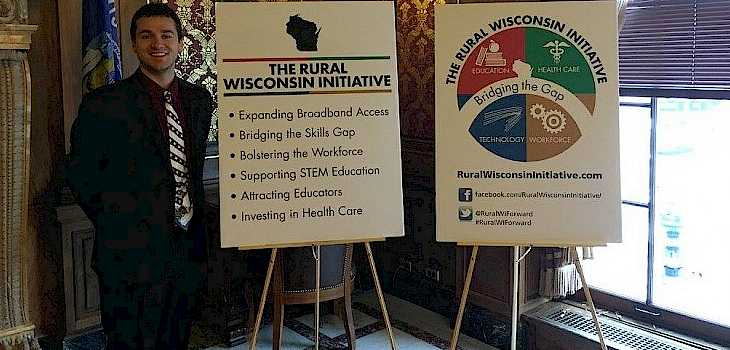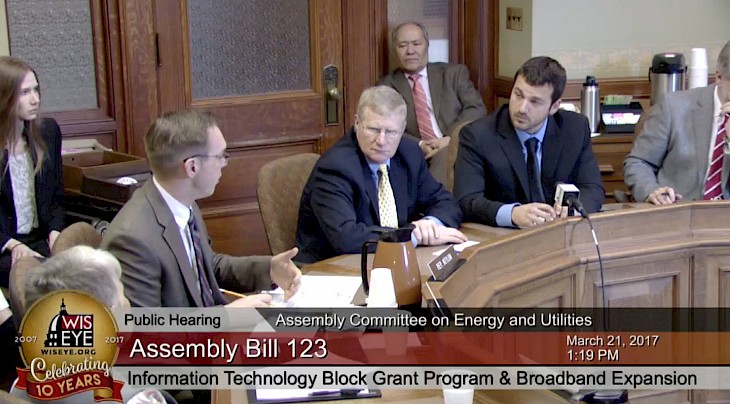(Image Via The Rural Wisconsin Initiative)
Rep Quinn, Assembly District 75 (R - Rice Lake), is leading the charge to expand broadband access to rural areas in Wisconsin.
“Broadband is the crucial 21st-century infrastructure,” said Rep Quinn in a recent communication with DrydenWire.com. “Whether it’s health care, education, or workforce development, high-speed internet touches every aspect of life. It’s time to take the next step in making sure rural areas have the same opportunity as more urbanized parts of the state to access this technology.”
On Tuesday, March 21, 2017, Quinn spoke to the Assembly Committee on Energy & Utilities on his bill (AB: 123) to expand broadband access to rural areas:
(Image Via WisconsinEye)
Ladies and Gentlemen, good afternoon and thank you for the opportunity to testify on Assembly Bill 123, which would help Wisconsin make significant strides forward in providing broadband to our rural areas.
When the Rural Wisconsin Initiative began, we wanted to focus on four areas that would make the most significant impact for outstate communities in our state. Those areas were health care, education, workforce readiness, and technology. While researching these areas and how we can make state investment go as far as possible, we realized that high-speed internet was inextricably tied to each of the other issues. Recognizing that broadband technology is truly the next century’s critical infrastructure, we called for an expansion of Wisconsin’s Broadband Expansion Grant Program to $10 million per year.
That call began a conversation across the state on broadband access, which led to the creation of the 2016 Study Committee on Rural Broadband.
The bill before you today is a product of a proposal by Governor Scott Walker and the findings of the Study Committee. Our bill allocates $15.5 million more for rural broadband grants during the current fiscal year, which is currently funded at $1.5 million. Additionally, we are adding funds to the Technology for Educational Achievement (TEACH) program. The funding comes from surpluses in the Universal Service Fund (USF) and the E-Rate reimbursement fund. No other programs are being impacted by this allocation.
That’s the funding aspect. Equally crucial is the improved ability to target these projects to the rural areas that need them the most. The Study Committee identified a number of criteria that should serve as considerations when implementing broadband projects. Members noted the need to focus on economic development, and defined the guidelines for this. Previous legislation only allowed PSC to allow projects going to “unserved areas” – those with no current access to internet at all. We broaden that to allow PSC to fund grants for “underserved areas,” where internet exists but speeds are extremely slow. This bill also ensures that we are considering educational and health care opportunities created by broadband access.
Quite simply, when we pass this bill, we will be able to drastically expand the broadband projects being put in across the state, without raising any new taxes, fees, or assessments.
Previously, Quinn also gave his testimony before the Senate of Revenue, Financial and Rural Issues:
Chair and members of the committee, thank you for inviting me to testify today. Broadband is a critically important infrastructure for rural Wisconsin, and I was proud to work with Senator Marklein on this bill.
A little more than a year ago, 24 rural Assembly legislators formed the Rural Wisconsin and pledged to focus on the issues that have the greatest impact on outstate areas: education, health care, workforce readiness, and technology. Our tentpole piece of legislation was Assembly Bill 798, which called for expanding funding to Wisconsin’s Broadband Expansion Grant Program to $10 million over the biennium. Although that bill did not pass, we began a conversation that continues with Senate Bill 49.
Increasing our efforts to expand broadband access to rural areas is a crucial step in maintaining the viability of our rural communities. We know that broadband access is crucial infrastructure for businesses to set up or remain in a community; for students to be able to complete their homework; and for hospitals to communicate effectively, both internally and with their community. When buying a new home, one of the top criteria for the millennial generation is broadband access. I recently bought a home, and my staff can tell you how difficult it was for us to communicate before I had a strong internet connection in my house.
Senate Bill 49 expands on Governor Walker’s call for $35.5 million in funding for the Broadband Expansion Grant Program. It targets the areas that need it most. While the significant amounts of federal money provided by CAF II and related programs will do great things in many parts of the state, that money simply is not going to get to the last-mile rural areas that are most in need of this access. Through the Study Committee on Rural Broadband’s efforts, we have been able to craft a bill that ensures that Wisconsin money goes to the areas of highest need.
We have targeted this money in a number of ways: Previously, although the Public Service Commission was required to use economic development as a priority, was not defined. We have corrected that, ensuring that we target projects that promote job growth or or expand an area’s tax base.
We also note other criteria for consideration: do projects duplicate existing infrastructure? Do they increase home access to health care service or students’ educational opportunities?
Finally, TEACH grants also have additional guidance: The bill also changes the eligibility criteria for these grants from a school district that has 13 pupils per square mile to a school district that has 16 pupils per square mile and a membership of 2,500 or less
With these considerations in place, we will ensure that we are responsible stewards of taxpayer and that we are maximizing our investment dollars.
Like highways a century ago, broadband is the major infrastructure of the 21st Century. Having strong access to broadband will give our rural communities the level playing field they deserve, and improve lives across the state. The time to act is now.
To learn more about this bill or express your thoughts, please contact Rep. Quinn by email at Rep.Quinn@legis.wisconsin.gov or on Facebook.
Last Update: Mar 24, 2017 7:23 pm CDT

















